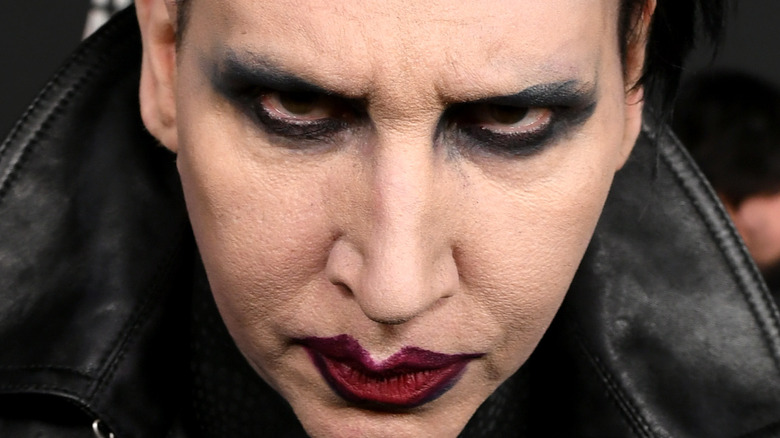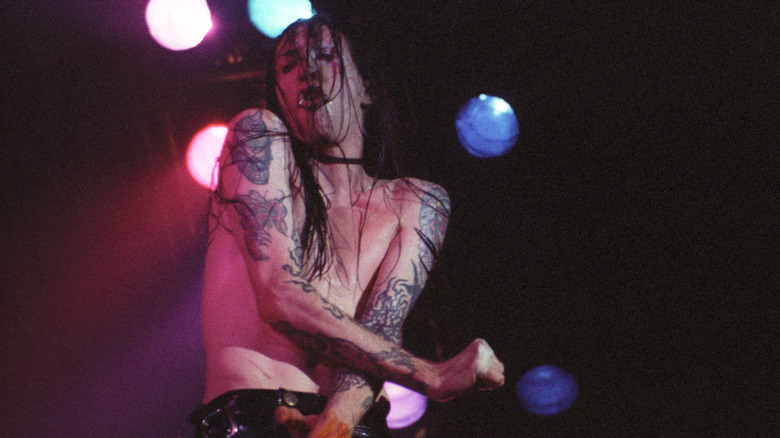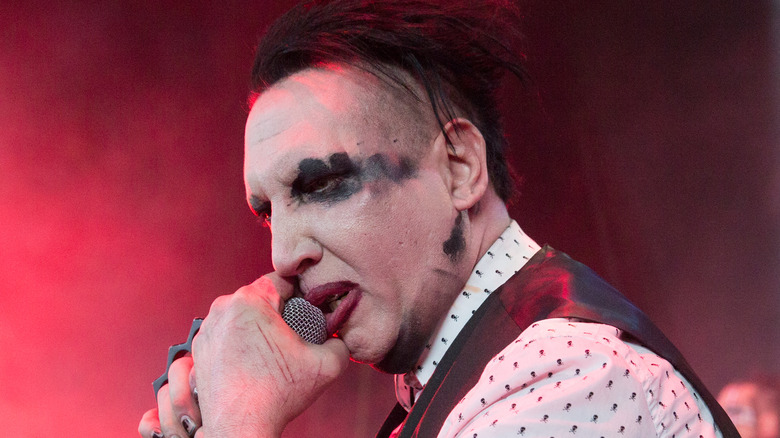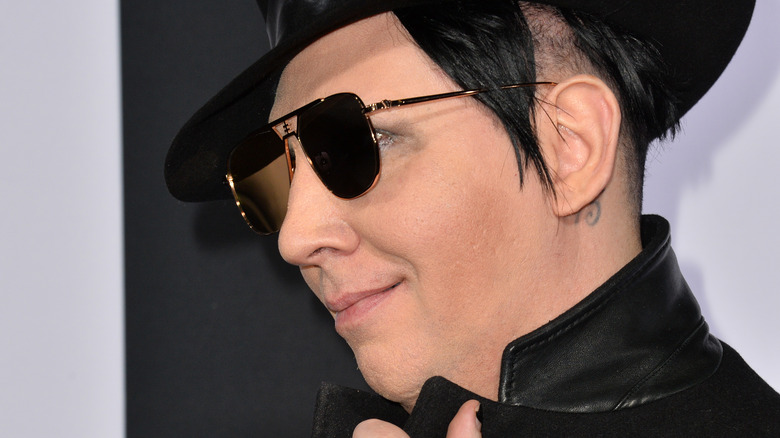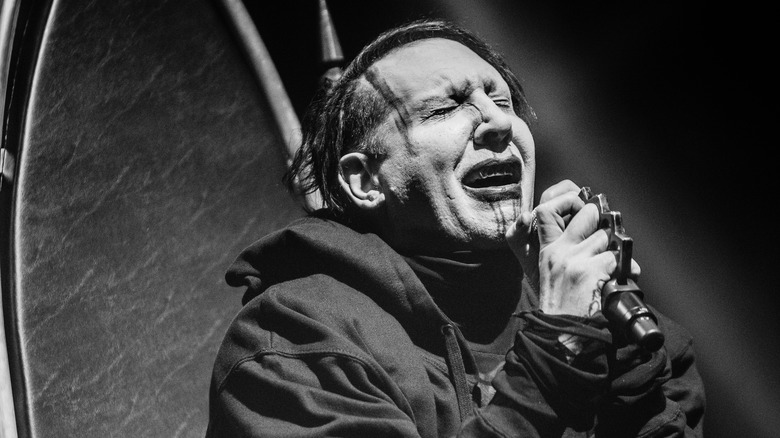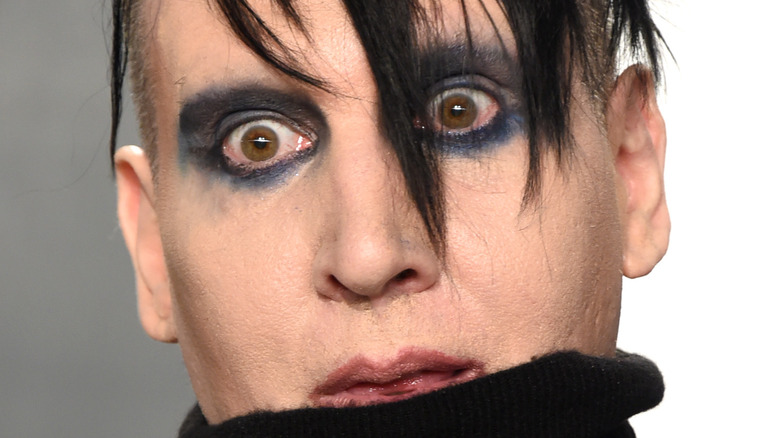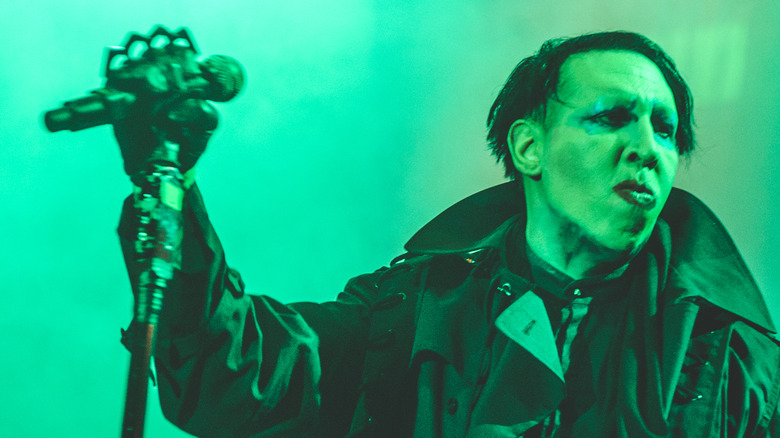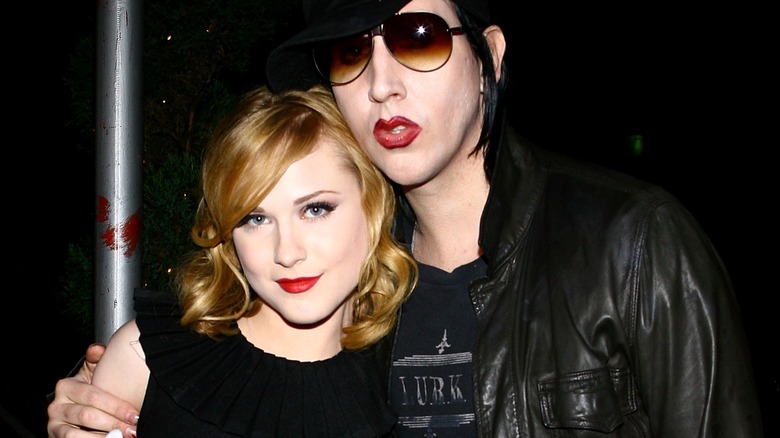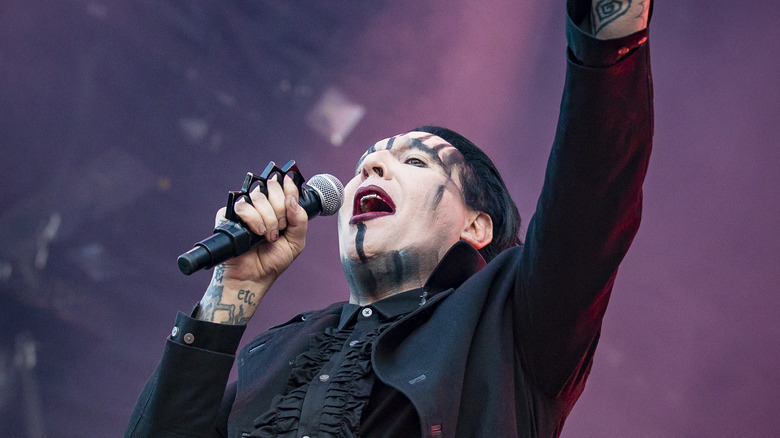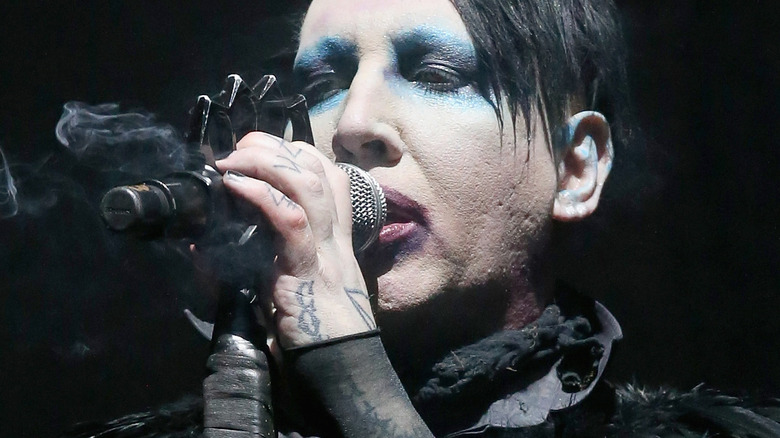The Rise And Fall Of Marilyn Manson
The following article includes allegations of domestic abuse and sexual assault.
Shock-rocker Marilyn Manson was one of the most controversial figures in music for years. As reported by The Washington Post in 1997, police, government officials, and concerned parents attempted to shut down his concerts due to fears that he was corrupting the youth, worshipping Satan, and inciting violence. In spite of (or more likely encouraged by) these allegations, fans related to the anger, irreverence, and disenchantment in Manson's music. As described by Salon, for some outcast teens, Marilyn Manson became a refuge from a family and community they felt rejected by. In the wake of allegations of extreme psychological, sexual, and physical abuse, Manson's legacy is being reevaluated.
While Manson was a highly successful musician, earning Grammy nominations, appearing on magazine covers, and topping the charts, the moralistic backlash against him led some to see him as rebellious and misunderstood, persecuted because of his dark imagery and edgy persona.
in 2018, actress Evan Rachel Wood testified about sexual assault and domestic abuse from her ex-boyfriend: Marilyn Manson. Since then, as detailed by Rolling Stone, more stories of Manson subjecting others to violent abuse have come out. Former devoted fans have had to grapple with the truth about who their icon really was — and the violent personality he never really tried to hide.
Marilyn Manson created his persona first
Before there was Marilyn Manson, there was Brian Warner. His pseudonym is a combination of the first name of glamorous sex symbol Marilyn Monroe and the last name of infamous cult leader Charles Manson — two larger than life figures in the American consciousness, juxtaposing twin cultural fascinations with beauty and violence.
Warner's image of Marilyn Manson seemed to arrive fully formed — but without the music. As stated by The Guardian, Warner went to college for journalism, and the very first article he ever wrote was about a rock star called "Marilyn Manson" who didn't actually exist yet. Warner intended the name "Marilyn Manson" to be his stage name, but he hadn't actually written any songs to perform yet. As described by Kerrang, Manson's earliest shows were performed under the name "Marilyn Manson and the Spooky Kids." The first recording of Warner performing features him accompanied by acoustic guitars and a tambourine. The young Warner describes himself as bashful in front of crowds and at one point recites a poem for the small audience. The band seemed to come up with songs to cover in the moment and played them until Warner forgot the words.
The first Marilyn Manson hit was a cover
Marilyn Manson's first studio album was "Portrait of an American Family," released by Trent Reznor's label, Nothing. After Marilyn Manson's rise to fame, this album received more widespread attention and critical acclaim — in 2017, Rolling Stone even declared it one of the top 100 metal albums of all time — but when it was released in 1994, it was largely overlooked.
An EP of covers and remixes, "Smells Like Children," was released the following year and included a cover of the '80s new wave song "Sweet Dreams (Are Made of This)" by the Eurythmics. As described by Rolling Stone, the cover was a hit within the industrial music scene, setting the stage for more mainstream success for the third album: "Antichrist Superstar," which Manson has claimed was inspired by several apocalyptic dreams that the singer came to believe were prophetic visions.
Marilyn Manson would also record dark, spooky metal covers of songs by a variety of artists, including Depeche Mode, Johnny Cash, Carly Simon, and Screamin' Jay Hawkins.
Manson's anger appealed to alienated youth
Marilyn Manson's music depicts a specific kind of anger, alienation, and apathetic nihilism that is cathartic for many of its listeners. His act was intentionally subversive, irreverent, and blasphemous, and vitally important to adolescents who felt like outcasts. Occasionally, this caused a kind of moral panic.
As described by Salon, religious leaders, concerned parents, and school districts feared that listening to Manson's violent lyrics put children at risk. Some attempted to draw links between the violent imagery in Manson's lyrics and real acts of violence by possible fans. According to sociologist and author of "Teenage Wasteland: Suburbia's Dead End Kids" Donna Gaines, this narrative fails to consider that teenagers who were alienated by their community were drawn to the music of Marilyn Manson and other controversial artists, but their problems were not caused by them. Instead, Gaines argued that Manson's music "probably saved more kids' lives than any parent would like to admit."
Manson has spoken extensively about his own difficult childhood in suburban Ohio. In interviews with Rolling Stone, Manson stated that his father had a violent temper, his mother was abusive (possibly having Munchausen syndrome by proxy,) and at school he was forced to sit through Christian lectures condemning heavy metal music for containing secret satanic messages — sparking his first interest in becoming a rock star. As stated in an interview with Kerrang, his religious school's frequent discussion of the end of the world and the coming of the Antichrist left him with devastating nightmares.
Manson was more controversial after Columbine
In the immediate aftermath of the 1999 mass shooting at Columbine High School, the public was desperate for answers. The media speculated wildly, and as described by Kerrang, the most popular narrative was that the two shooters were Marilyn Manson fans who had decided to commit murder because of his music. The narrative was pervasive. In a 2017 interview with The Guardian, Marilyn Manson stated that the Columbine mass shooting destroyed his career — but as argued by Metal Sucks, Manson's career was already stagnating.
In 2002, Manson was interviewed for Michael Moore's "Bowling for Columbine," a documentary about the tragedy. He was asked what he would say to the kids at Columbine, and many have praised his response (via Kerrang): "I wouldn't say a single word to them. I would listen to what they have to say. And that's what no one did."
This exemplified the kind of understanding for troubled youth that had attracted many of Manson's fans to begin with — but many of his less-quoted replies make it sound more like Manson was jealous of the killers. In one interview, Manson seemed to resent that the shooters were on the cover of Time magazine while he never had been (via Metal Sucks). As noted by Rolling Stone, in another Manson complained, "I got blamed for Columbine, and I had absolutely nothing to do with it. At least [the killers] had their kicks before the whole s***house went down in flames."
If you have been impacted by incidents of mass violence, or are experiencing emotional distress related to incidents of mass violence, you can call or text Disaster Distress Helpline at 1-800-985-5990 for support.
Marilyn Manson positioned himself as anti-mainstream
Part of Marilyn Manson's appeal was his rejection of mainstream values, cultural beliefs, and American ideologies. In his autobiography, Manson described himself as "an alarm clock" waking the world up from unexamined beliefs instilled by Christianity and the media.
While Manson's sound was not particularly revolutionary or challenging, the content of his work was always exploring taboos. As detailed in an article by researcher and writer Coco d'Hont, much of Manson's early work explicitly questions institutions such as the nuclear family, tying them to extremist points of view and violence. As recounted by Vice, from his very first album, Manson frequently used Christian imagery, drawing attention to the hypocrisy he saw within the religion's moral rules. He often depicted Christian iconography and American symbolism as being associated with oppressive regimes, fascism, and extreme violence.
While Manson's work was theoretically a rejection of mainstream ideas, it also is deeply tied to pop culture and celebrity. Manson himself never seemed to try to avoid being a part of mainstream culture, appearing on late night talk shows, marketing his persona, and becoming a commercial success. Rather than pushing away fame, Manson seemed to crave celebrity status.
Marilyn Manson was a self-destructive star
Whether or not Marilyn Manson's paradoxical position in American pop culture was a good fit for the kind of music he wanted to make, it made him a celebrity. But while his career was flourishing, Manson himself was spiraling.
In his autobiography, Manson described how his behavior had begun to push away his creative collaborators, costing him opportunities and stalling the production of his album. To cope, he engaged in self-harm and risky drug use. In an interview with Kerrang, he recounted how he had used stimulants to experiment with sleep deprivation. In an interview with Rolling Stone, Manson stated that there had been a pervasive rumor that he was going to die by suicide on Halloween, and that he began to feel like he would have to go through with it — however, a bomb threat on his Halloween concert prevented the situation.
The majority of Manson's public exploits and statements to the media were dismissed as rock star behavior, or an extension of his extreme antisocial persona.
If you or anyone you know is struggling with unhealthy drug use or experiencing suicidal thoughts, help is available. Visit the Substance Abuse and Mental Health Services Administration website, contact SAMHSA's National Helpline at 1-800-662-HELP (4357), or call the National Suicide Prevention Lifeline by dialing 988 or by calling 1-800-273-TALK (8255).
Manson stopped being relevant
While Columbine damaged Marilyn Manson's career, trying to challenge mainstream pop culture while also positioning himself firmly inside it may have ultimately done more damage. In 2017, MTV reported on an apparent celebrity beef between Marilyn Manson and pop star Justin Bieber. Manson claimed that Bieber claimed he was making the shock-rocker "relevant again" by selling his old merch. Whether or not the Bieber T-shirt drama was real, it was emblematic of a larger issue in Manson's career: He wasn't really shocking anymore.
An article by Westword in 2018 described Manson as no longer scary, and theorized it was because American society had caught up with him — the news was more shocking than his act. Manson continued to release albums full of violent imagery, but over time the majority of his media coverage shifted from outrage and backlash to reporting on celebrity drama, his romantic relationships, amusingly awkward appearances on TV, and in 2017, an injury. As described by The Guardian, Manson, who was 48 at the time, accidentally pulled a large stage prop onto himself during a show, causing him to be carried offstage in a stretcher. Later, he would have to perform several live shows in a wheelchair.
Some fans complained that the quality of Marilyn Manson's concerts was going down. The Westword article which questioned Manson's ability to shock a modern audience also remarked that his live vocal performance wasn't particularly strong, and described him as "a little sad."
Manson walked offstage
After his 2017 injury, Marilyn Manson was forced to cancel several live shows. The following year, one of his concerts took an equally dramatic downturn that ended with his fans cursing at the empty stage and demanding refunds for the show.
As described by Brooklyn Vegan and seen in a brief clip of the show posted by an attendee, Manson only made it through about three to five songs. According to those at the event, Manson spent a large part of his performance facing away from the audience, mumbling along to his backup band, and shuffling on and offstage, sometimes leaving his band alone onstage for 10 minutes at a time. Fans in the audience stated that at one point he spent some time urging the audience to reassure him that they loved him, before throwing the microphone and leaving the stage.
Many at the event theorized that Manson had been intoxicated, while others believed he was experiencing some kind of mental health crisis.
Evan Rachel Wood testified at a congressional hearing
In 2018, actress Evan Rachel Wood participated in a House judiciary subcommittee, sharing her experience with physical, psychological, and sexual domestic abuse. Several years later, she publicly confirmed that she was talking about her former partner, Marilyn Manson.
As transcribed in an article from Huffpost, Wood testified that during their relationship, which began when she was 18 years old, she suffered "Toxic mental, physical, and sexual abuse, which started slow, but escalated over time, including threats against my life, severe gaslighting and brainwashing, waking up to the man that claimed to love me raping what he believed to be my unconscious body, and the worst part, sick rituals of binding me up by my hands and feet to be mentally and physically tortured until my abuser felt I had 'proven my love for them.'"
Wood described how she feared trying to escape Manson, believing that he would kill her (which she stated that he threatened to do many times). As a result of the abuse, she experienced depression, agoraphobia, night terrors, and addiction, and developed post-traumatic stress syndrome (PTSD).
Manson's response was a denial, and the implication that he was being targeted because of his controversial work. In an Instagram post (quoted via Rolling Stone) he stated: "Obviously, my art and life have long been magnets for controversy, but these recent claims about me are horrible distortions of reality."
If you or anyone you know has been a victim of sexual assault, help is available. Visit the Rape, Abuse & Incest National Network website or contact RAINN's National Helpline at 1-800-656-HOPE (4673).
There were many more stories of horrendous abuse
Since Evan Rachel Wood's testimony, more than a dozen women have come forward with their own stories of Marilyn Manson's abuse. The accusations include accounts of Manson subjecting his partners to violent physical abuse, including cutting them with knives, electrocuting them, and once, chasing his partner with an axe. As described in an exposé from Rolling Stone, there have been many, similar stories of extreme psychological abuse. The most bizarre of these involves a soundproof former recording booth made of glass, that some have stated Manson turned into a cell that he forced his partners into for hours at a time as a form of punishment, keeping the environment freezing cold, keeping food from them, and preventing them from sleeping. The cell was described more than 5 years before Wood's testimony, in a 2011 interview with Manson himself, in which it was called the "bad girls room."
Several of Manson's accusers, including model Ashley Morgan Smithline and actress Esmé Bianco, filed lawsuits against him, with charges including human trafficking and unlawful imprisonment.
If you or someone you know is dealing with domestic abuse, you can call the National Domestic Violence Hotline at 1−800−799−7233. You can also find more information, resources, and support at their website.
The fallout came quickly
Legally, it's unclear what consequences Marilyn Manson might face. Several lawsuits were filed against Manson, though two have been dismissed due to the two-year statute of limitations. In November 2021, Special Victims Unit investigators raided Manson's Los Angeles home, but a source with the LA County Sheriff could not provide Rolling Stone with details on what was found during the search of Manson's belongings. After the very public defamation trial between Amber Heard and Johnny Depp, Manson is attempting to sue Evan Rachel Wood for defamation. Insider reported that some social media accounts dedicated to defending Depp have begun posting content about Manson. While some fans appear to be backing Manson, in the immediate aftermath of Wood's allegations journalist David Futrelle reported that the majority of Manson's online fans seemed to believe Wood.
Manson's career has experienced rapid fallout from the accusations. As reported by Variety in February 2021, Manson was dropped by his label, Loma Vista Recordings, stating that they would no longer promote his current album or work with him on any future projects. The following day, Manson's agents at CAA also dropped him (per The Hollywood Reporter). Manson's scenes were cut out of a third-season episode of the television show "American Gods," and the streaming service Shudder decided not to air an episode of "Creepshow" which he appeared in.
Marilyn Manson's legacy has changed
In the wake of the accusations against Marilyn Manson, longtime fans (some of whom are survivors of domestic abuse themselves) have had to reconcile their feelings about Manson and his music with the stories of extreme psychological, physical, and sexual abuse told by his former partners. Many of Manson's earlier statements have been reevaluated since the accusations, and stories that were initially dismissed as typical rockstar bravado have been reassessed as a part of a pattern of cruelty and violence.
As described by an investigative report from Rolling Stone, Manson's early stage act included hitting a woman in a cage. In his autobiography, Manson joked that he might have caused brain damage with his onstage beatings, and briefly considered murdering her with a bandmate. In an interview in 1995, he stated that he was attracted to women who were terrified of him. After Evan Rachel Wood split up with him the first time, Manson told Spin that he had attempted to get her back by calling her 158 times in a row while self-harming, with the intention of making her feel guilty. He also stated that he had "fantasies every day about smashing her skull in with a sledgehammer."
Manson's accusers believe that the shock-rocker was able to use his controversial persona to hide in plain sight. Marilyn Manson's anger had been seen as a rebellion against an oppressive and hypocritical society — but in retrospect, he never hid who he really was.
